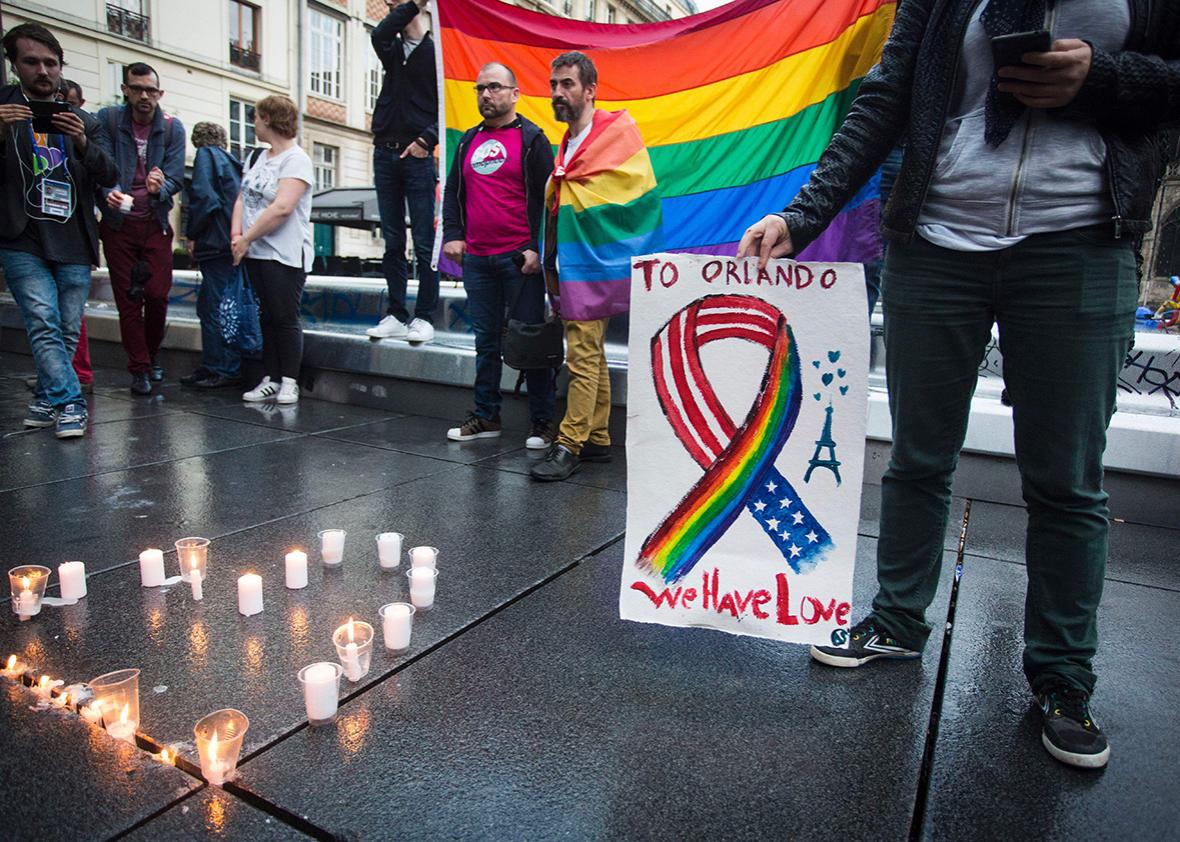The mass murder over the weekend at a gay nightclub in Orlando, Florida—at last count, at least 50 people were killed—has focused attention on violent Islamism and gun control. But it has also highlighted the threats and violence faced by members of the LGBTI community. (The father of the alleged Orlando killer has stated his son was upset about men kissing in public.)
I spoke by phone on Sunday with Tarah Demant, senior director of the Identity and Discrimination Unit at Amnesty International USA. During the course of our conversation, which has been edited and condensed, we talked about different types of violence against sexual minorities, ISIS’s murder of gay men, and the threat we all face when hateful rhetoric crosses borders.
Isaac Chotiner: What are some of the threats LGBT people are currently facing?
Tarah Demant: About the horrific violence in Orlando, there is a lot we don’t know. What we do know is that LGBTI people and people who others think are LGBTI-identified face horrific violence and targeted violence worldwide. This is a growing problem, unfortunately. We have seen this in our own country where trans women of color, in particular, are under threat.* We see this globally in terms of laws that criminalize consensual same-sex behavior, and create a hostile environment not only for LGBTI people in their communities, but with the police. In Tunisia, for example, consensual same-sex relationships are banned and LGBTI-identified people who go to the police are often targeted by them. In Bangladesh very recently, an LGBT rights activist was hacked to death, and we have still seen no indictments or justice.
What sort of anti-gay and anti-LGBTI propaganda have you been seeing from extremist groups?
There are groups in every country. This is not just a foreign problem. Groups everywhere either work to create a culture of hate and fear, or are specifically propagating violence. The type of violence we are seeing in Uganda, for example, is in part about the government itself targeting LGBTI people and drafting a bill in which you could get the death penalty for the “crime” of being gay. (The ultimate punishment was eventually modified to serious prison time.) But worldwide, you have people voting in politicians that will pass these sorts of laws. We see this with not just elected groups but terrorist groups targeting and scapegoating LGBTI people for what they see as the ills of the world.
Can you talk about the ways terrorist groups, specifically extremist groups like ISIS, have targeted people from the LGBTI community?
Over the past year, forces from the group that calls itself the Islamic State has killed dozens of men in Iraq and Syria it alleges were gay. It did this by throwing them from the roofs of buildings. We have seen the same type of targeted violence in Nigeria from extremist groups. We have seen that type of violence against women and girl children as well.
Do you think we are seeing backlash to some of the strides that have been made in terms of expanding rights, or do you think violence is just more visible now, here and worldwide?
Certainly the visibility of LGBTI minorities has increased, and because there are places where LGBTI people can live lives of dignity and human rights, they are more visible. But this type of violence has been around for a long time. I do think we are seeing a backlash, though. We see in our own country the legal backlash, with things like bathroom laws, which have absolutely nothing to do with public safety and everything to do with hate and discrimination. It is planned and politically motivated. We have seen politicians in the United States scapegoat LGBTI people, saying that particularly trans people, and trans people of color, are dangerous and that they pose both a physical threat and a threat to morality.
This type of propagation is one of the reasons we have seen hate crimes continue. And while we have certainly seen progress, and celebrate that progress, LGBTI people are targeted everyday with violence here. One of the things that particularly concerns us is the invisibility of trans women and trans women of color, who are not only attacked but brutally murdered on a consistent basis. And it doesn’t hit the news the way other violence does. I think that has a lot to do with the way we value—or don’t value—trans women of color.
You also have a situation now where right-wing Christians here inspire anti-gay activism in Africa and elsewhere.
Anti-LGBTI activism abroad is well-funded and backed by American religious extremism. It’s important to think about what our role is and the way that hate spreads. It is a complicated thing for us as an international organization. We not only want to respond to threats, but we want to get at root causes so that one day we are out of a job. Here in the United States and globally, we are not a community of human rights.
And it goes the other way now. Who knows to what degree this guy was inspired by people abroad, but the traffic in harmful ideas, as we have seen with ISIS—and not to draw moral equivalence—goes both ways.
Correction, June 12, 2016: Due to a transcription error, this article originally quoted Tarah Demant as saying that trans men of color were under particular threat, rather than trans women of color. (Return.)
